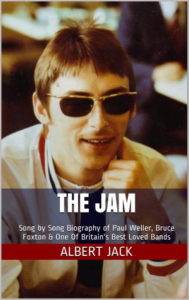I was one of those rare Jam fans who discovered the band via their apparently unpopular second album This Is The Modern World. In January 1978 I was 13 years old and a friend of mine pulled the album out and played it to me.
He told me they came from the same place as us, Woking, so we sat and listened to it one afternoon. He reckoned his elder sister had seen them play down at Michael’s Club some years earlier.
A few hours later I was out washing cars to raise the money for my own copy, and a copy of the band’s debut album In The City.
That’s possibly the reason why I still regard Modern World as such an important set of songs – and why the constant criticism that album has come in for frustrates and irritates me. So, in these pages I will try to make it clear why that release was, and still is, so important.
With the demise of the band in 1982 it became hip in some Jam circles to diminish drummer Rick Buckler and bassist Bruce Foxton, and even to forget about original band member Steve Brookes, while collectively agreeing that the whole thing had been The Paul Weller Show.
That, too, has irritated me. As far as some writers are concerned, Buckler and Foxton feel hard-done-by and are bitter and bemused at Paul’s decision to move on.
But both Rick and Bruce are friends of mine and at no point in the last 20 years have I heard either of them say an unpleasant word about anything. They know the value of the part they played in the band and so do I.
Steve Brookes, in his honest and accurate account of the early Jam, Keeping The Flame (an essential read for Jam fans), clearly indicates that he too knows the value of the part he played. But, characteristically, Steve understates the case. I hope I can give him the credit he deserves here.
As I wrote this story I had four imaginary readers sitting on my shoulder and I owe them my thanks for their imaginary criticism. The first reader is the Jam fan, who will be the most critical of all.
All of them know The Jam better than the next one (and that is part of the mystique of the band) and I already realise I could be picked up at every turn by fans who say ‘This isn’t right and that isn’t right’. So I have taken great care to be as accurate as possible.
The second reader is the non-Jam fan who wasn’t present on the 70s/80s scene, and who therefore needs some of the details explained – details which the big Jam fans will consider a case of ‘stating the bleeding obvious’, for which I apologise in advance.
The third group of readers are Messrs Brookes, Buckler, Foxton and Weller, who need no introduction and who I hope will read this story.
I want to emphasise that criticism is not the intention, the intention is to create an honest picture and to tell the story as it actually happened. My research suggests that it was Foxton and Brookes who were crucial to The Jam’s emergence and subsequent stability. But I make no apologies to those who cry ‘sycophant’, as I am an obvious Weller and Buckler fan too.
The fourth reader is my publisher, Reynolds and Hearn. I know that sensationalism would sell them a shed full of books but they didn’t want that and nor did I (the sensationalism part, I mean). They simply asked me to ‘tell it as it happened’. And that, quite simply, is the reason I agreed to write it.
There are two further motives for writing this book. The first is Ian MacDonald’s Revolution In The Head, which tells the story of The Beatles. When I read it in 1999 it fascinated me and I still refer to it when I hear Beatles tunes.
I thought that weaving the story around the important thing, the songs, was a wonderful idea and my immediate reaction was to look around for such a balanced account of The Jam, but there wasn’t one.
Like Ian I wanted to create a chronology of the music. But, instead of labouring too hard over the technical details of each song, I saw the opportunity to tell the inside story of a group of schoolmates, who grew up to dominate the music scene of a generation.
The second reason came earlier this year when I was sitting in a pub in Guildford with Bruce Foxton.
A young fan came over for an autograph and a chat. Bruce duly obliged and after a short while the lad made to leave and said,
‘It’s great to meet you, I have always loved your music and I don’t believe any of the shit that’s been written about you.’ Bruce just laughed and replied, ‘Thanks very much. Nor do I.’
I decided that I too had heard enough of that sort of thing and that it was time the true story of The Jam was told, without slant or spin, name-calling, side-taking or rancour. What’s the point in all that? It’s the music that matters.
Albert Jack, Guildford – May 2003 (Revised June 2015)
Albert Jack AUDIOBOOKS available for download here

The Jam: Sounds From the Street

